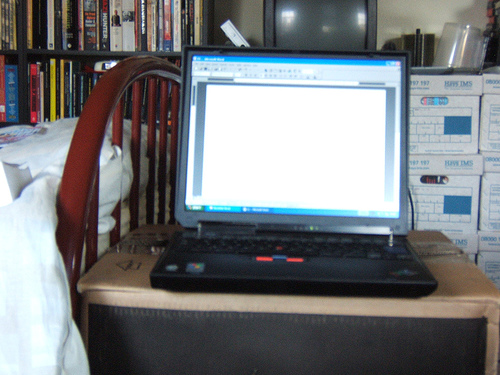
Writing–especially writing and trying to sell large projects, like novels–is a clear-cut example of an area where self-motivation is essential. While this post is written especially for writers, the techniques I’ll talk about can be applied to practically any kind of project where self-motivation is needed.
Motivating ourselves to write can be hard: blank pages stare at us implacably, or we get 75,000 words into a novel and then realize there’s a basic flaw that will require a huge rewrite, or we’ll get dozens of rejection letters for every acceptance.
Writers generally need enthusiasm for a story to do a really good job of writing it, need to sustain their involvement in a project for months or often years, and need to be able to face rejection after rejection without giving up. Even very good writers typically see many rejections before they sell their work (Stephen King, when he started his career, put a big nail in his wall and spiked each of his rejection letters on there as he went. Fortunately, it turned out well for him in the end, although he collected hundreds of rejection letters before he really got off the ground). Self-motivation is tough in this kind of environment. Here are some tools for maximizing it. These notes can be useful to any writer, but they’re mainly written with fiction in mind.
Pick Your Project Very Carefully
A certain kind of writer tends to write whatever they’re most passionate about, regardless of length, genre, marketability, and so on. Another kind of writer tends to write whatever seems to be the most salable, whatever the market seems to be crying out for. A third kind of writer tends to follow some particular pattern dictated by their writing practices, being propelled neither by passion nor by saleability but by process. All of these approaches have their good points, and each can have real drawbacks under certain circumstances. The approach I would suggest is different from all of these: it’s to put extra effort into brainstorming, then making a careful selection from the possibilities.
What I mean by this is that when it’s time to start a new project–say the last project is finished, or has been scrapped, or needs to sit in a drawer for a while before you can get any perspective on it, or this is your first novel–instead of looking for an idea for a new project, you look for a lot of ideas for new projects, using a variety of methods to come up with them. Review ideas you’ve jotted down or the ones that have been in your head. Look at some of your favorite books and see what you like most about them. Sit down and brainstorm at least two or three ideas out of the blue.
But why go to all this trouble when you have an idea you already know you’re burning to write, or that you think will sell well? Because our first ideas are often not our best ones, and a little time spent picking the right goal can save a huge amount of time working on the wrong one. It’s well worth slaving away at this brainstorming phase for a few hours even if at the end of it you opt for the idea you were interested in in the first place, if for no other reason than to understand deeply and clearly exactly why that idea is the best one for you to work on. And many times careful consideration of possibilities will yield a much better idea than anything that would have come up on its own.
Then comes the choosing. Passion counts for a lot: it’s very difficult to make a reader passionate about a book that the writer wasn’t passionate about when it was written. But other factors should probably figure in too, unless you’re only writing for yourself. Marketability? If you really want to sell your work, it would be ill-advised to ignore this unless you’re of the opinion that it’s impossible to tell what will sell. So writing a vampire novel because you love writing about vampires isn’t a bad idea, and writing a vampire novel because they’re in demand (let’s suppose) can work out well, but by far the best reason to write a vampire novel is that you’re passionate about it and someone’s clamoring to buy that kind of thing.
This applies to any decision: we often try to make choices based on one overwhelming factor, like buying something because it’s the cheapest or because we’re enchanted with it. But any of our priorities we put aside when making an important decision will come back to haunt us later. If the cheapest item breaks long before the more expensive version would have, or if the thing we’re enchanted costs so much that we end up short on the rent …
But what does choosing well have to do with self-motivation? There are two key things: first, it’s not that helpful to motivate ourselves toward a goal we don’t actually want to reach. While even working toward a wrong goal can be educational, the same can be said of working toward the right goal, and the right goal has the additional benefit of paying off, which is an educational experience in itself.
Second, if we are working toward a wrong goal, sooner or later we will realize it isn’t something we really want to achieve (or we’ll achieve it, and the expected payoff will never materialize), and then we’ll be back to zero, with the sense that work gets us nowhere.
Always Keep In Mind What Excites You
Whatever gets you excited about writing a book is worth thinking about regularly. If you find your writing has turned into drudgery and you’re just trying to slog through until the end, you’ll have a lot of trouble motivating yourself and may not produce particularly great writing either (though there can be exceptions to that last part). If you hit this point, one approach that can propel you forward is to ask yourself “What would really get me excited about this project right now that I’m not already doing?” Kill an important supporting character, cause a disaster, give the protagonist what they’ve been striving for and see them realize that it isn’t their real goal at all, add a new character who churns things up … this is another case where more excitement for the writer tends to mean more excitement for the reader. All of this has to be kept in balance with your vision for the story, but if you can’t think of anything that keeps you excited about the writing and is consistent with your vision, maybe it’s time to rethink the vision.
The exception I know of in which drudgery can yield good writing is when you know your story much better than your reader, and so what feels like old hat to you is new and fresh for the reader.
If You Stop Feeling Motivated, Retrace Your Steps
Here’s a question that can be handy in projects that seem to have lost their drive: where was my motivation when I last saw it? Sometimes feeling like you’ve lost your enthusiasm means that you took a wrong turn somewhere. Maybe your interest in the story was being kept up by a minor character who according to your outline (if you use outlines) needed to leave the story a little while ago, but the story hasn’t interested you as much since. If so, it might be worth rethinking that decision. Maybe a character did something that violates who you were hoping for them to be, or made a choice to serve the plot instead of doing what they would really want to do if left to their own devices. Maybe you’re writing a section of the book that isn’t really needed.
Regardless, always be ready to take advantage of this great advantage of writing, that you can make a complete mess of something, but then go back and do it better and get full credit as though you had written it perfectly the first time. There’s a post on this subject on my writing blog: Avoiding Your Story
Use Support, Encouragement, and Deadlines
One of the best motivators for a project is to have a real deadline, with a real person is waiting to see your results. This can be accomplished through joining an active writer’s group, blogging about your writing and including planned deadlines, getting one or more writing buddies and reading each others’ work, signing up for a writer’s workshop for which you’ll need something to be completed by a given date, working on a project for a contest or market that has a firm deadline, or getting truly interested friends or family members to read your writing as you go. It’s powerfully motivating to realize that someone is waiting breathlessly for the next chapter of your book.
If you use this last approach, by the way, you may want to ask the person to write down any feedback they have, but only to give that feedback to you right away if it’s absolutely crucial. The rest can be collected at the end so you can consider it for the second draft. Getting constant feedback can cause constantly reworking what you have, which … well, let’s just make that subject a section to itself.

I don't think you can get into this particular writers group any more, but there are others.
Don’t Spend All Your Time Reworking
Yes, often writing can be improved by editing or rewriting, but only to a certain point. After a while, more work on the same project will begin to suck the life out of it. Make your story as good as you can make it at the moment, then send it out without spelling errors or major problems. You can set it aside and revisit it once you have perspective, or rewrite it after a rejection if you have a major new insight about it, but don’t just keep fiddling with it it’s perfect: nothing ever is, to the best of my knowledge.
Writer’s Block Is Just Fear of Writing Something That Isn’t Good Enough
On my writing blog I have a lengthy post about writer’s block, which I’ll summarize here as it applies to motivation: it’s always possible to write something, even if that something turns out to be meandering gibberish. So writer’s block doesn’t prevent a person from writing: it makes them hesitant because they might write something bad. Since everyone writes something bad sometimes, this isn’t as dire a situation as it may feel like at the time. Screwing up is an appropriate thing to worry about with surgery or disarming bombs, but it usually just gets in the way to fret about it with something like writing. Remember, you can always fix it in the next pass, and sometimes bad writing ends up being an exploratory draft (a great term I first heard from Orson Scott Card) that will reveal exactly what you need to do to write the really great draft you’re going to put together next.
Don’t Get Too Attached
It’s hard sometimes to look at something you’ve put a lot of work into and decide to scrap it, whether it’s plans for a new business venture that isn’t going to work out, a relationship that turns out to be between the wrong two people, or a brilliant passage in a novel that doesn’t belong there. When you’re faced with these problems, take a step back and ask yourself what will really give you the best result in the long run, then keep the thing or remove it based on that choice (and if applicable, whatever responsibilities you may have taken on).
This doesn’t quite add up to “kill your darlings,” as writers are often urged to do, or as Samuel Johnson put it “wherever you meet with a passage which you think is particularly fine, strike it out.” That’s overstating it. Some things you do that you love will just not fit in the project you’re working on, and it’s important to focus on making that project as good as it can be instead of on justifying all the great things you did along the way. Doing great things is its own justification, and it tends to be instructive as well, whether or not they work out in the end. Fortunately, contrary to Johnson’s point, sometimes great passages are doing exactly what they’re supposed to and ought to be left in.
There’s more I could say on this subject, but I’ve covered the main recommendations I set out to cover, and future posts will have more. In the meantime, how do these recommendations work for you? And writers, what particular self-motivation issues do you run into in your writing?
Writers group photo by ShellyS.
Writing desk photo byBright Meadow






 Willpower is the kind of thing you need if you want to quit smoking or resist making snarky remarks at staff meetings or to make the effort to memorize names when you meet new people. Project motivation is the kind of drive you need to finish a novel, learn a foreign language, or make major home renovations.
Willpower is the kind of thing you need if you want to quit smoking or resist making snarky remarks at staff meetings or to make the effort to memorize names when you meet new people. Project motivation is the kind of drive you need to finish a novel, learn a foreign language, or make major home renovations.